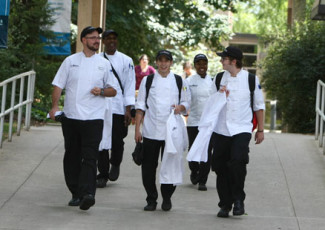Community College Foundation Finds Success
By Toni Coleman
May 31, 2016
The foundation supporting Maine’s community colleges has raised $32 million in five years.
The Foundation for Maine’s Community Colleges recently celebrated a big milestone: It has raised over $32 million in five years.
The foundation was created in 2009 in an attempt to cultivate business and foundation leaders who value the role community colleges play in meeting the state’s challenges. Leon Gorman, the former president of L.L. Bean clothing company, and his wife, Lisa, were the driving forces behind the foundation’s creation.
Gorman learned what Maine’s community colleges were doing for the state a few years before the foundation was created. At the governor’s behest, he joined other community and business leaders to discuss solutions for the state’s most pressing problems.
“The foundation was created with the top angel investors in Maine, who were willing to make philanthropic investments, reach out to their community, and create momentum that brought exciting and important people to the table to focus on community colleges,” says Jane Phillips, foundation president.
How the foundation formed
In finding other board members for the Foundation for Maine’s Community Colleges, Gorman talked with leaders of businesses and charitable foundations about the state’s workforce-development issues. His message: Companies — and the state — benefit greatly when community colleges supply a skilled workforce. Therefore, giving to community colleges is a wise investment.
From KeyBank to L.L. Bean, “we see all of these Maine companies that believe strongly in investing in students who are going to be their workforce,” Phillips says.
Phillips credits the foundation’s board for creating a network of influential and generous friends of the foundation that span the state’s political, corporate and foundation worlds. Board members include Lisa Gorman, former Maine Gov. John McKernan, and Kresge Foundation chair Elaine Rosen.
While the foundation focuses on major donors, each of the seven colleges that make up the community college system do the work of engaging former students. Central Maine Community College, for instance, hosts an annual alumni dinner. “That’s an opportunity for them to bring together people who are important to them at the local level,” Phillips says.
Funding priorities
The priorities for the system, which enrolls 17,500 students, are ensuring student success and boosting retention and graduation rates.
In terms of foundation priorities, “that plays out in terms of work-study opportunities on campus,” Phillips says, noting that creating campus jobs are important for student retention. “Students who work off campus are pulled away from their academic endeavors.”
The system is also investing in success coaches or navigators — “people who can answer all kinds of questions, like ‘What happens if I go on academic probation?’ Or ‘What happens if my car breaks down?’” Phillips says. “The at-risk student population is quite large. Our students need extra support.”
Moving forward, the foundation will continue its work with major philanthropists in Maine while also seeking support outside the state. “Maine is a small state. We have to think about how we’re making our philanthropic work sustainable over a long period,” says Phillips, who worked in development at New York and Yale universities before coming to the foundation 18 months ago.
A new system president is starting, so the foundation will need to hear his vision and generate gifts to support his goals. One thing is already clear to Phillips: “The new president is on board for the work that we do.”







